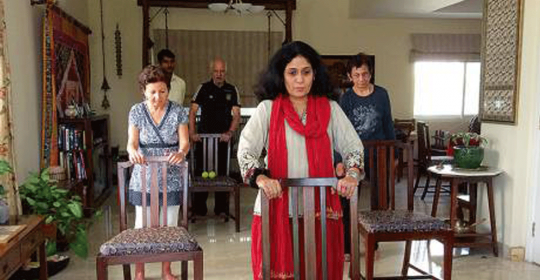
Care to dance? Dubai woman dares Parkinson’s patients
World Parkinson’s Day is round the corner. Here’s a heartening story of how small steps by an Indian dancer are making a big difference to people’s lives
Gulf News | XPRESS | Sharmila Dhal, Chief Reporter | DUBAI: Dubai-based Vonita Singh is a dancer with a difference. A classical Kathak performer, she uses her vast repertoire of skills not just as a form of art, but also a means to reach out to patients suffering from Parkinson’s Disease (PD), a neurological/movement disorder.
The 50-year-old Indian expat, who has a doctorate in anthropology and has undertaken a dance therapy programme in New York, has become an unlikely torchbearer for a little known community of Parkinson’s patients in the UAE, as she prods them and their caretakers to move on with their beleaguered lives.
Ahead of World Parkinson’s Day on April 11, nothing perhaps can raise better awareness about the degenerative and progressive disease than the message of Movement Mantra, Singh’s free-of-charge dance classes, held at her Umm Suqeim home twice a week.
As patients attend the 90-minute sessions, the simple, fun exercises that Singh teaches them help activate every muscle in their bodies. It is an attempt to keep the joints and muscles in use and thus delay the inevitable progression of Parkinson’s.
“Use me or lose me – that’s the case with our muscles. So the key is to keep them going and fight rigidity, the cardinal symptom of PD which results from lack of movement,” said Singh, who was motivated to do something for PD patients after losing her father to the disease in 2009.
Dr Jutta Marquardt, senior consultant, neurologist at the German Neuroscience Centre, explained:
“PD is a neurological disease which causes tremors (shaking of hands), slowed movement, muscle stiffness, impaired posture and other symptoms. It is caused by a degenerative process affecting some regions in the brain and when dopamine-producing neurons (nerve cells) begin to die. Dopamine is a chemical messenger between nerve cells.”
She said PD has no cure, but certain medications alleviate the symptoms. “Besides pharmacological treatment, there are other options to improve quality of life. Regular exercise and physical therapy, speech therapy, patient education, support groups and certain diets have beneficial effects,” he added.
Singh claims dance has distinct advantages in this context. “By learning a dance piece, memorising it through imagery and enacting it repetitively like a mantra, patients can retrain their brain and get their body to move.”
It doesn’t matter that some patients are confined to wheelchairs or some others use walkers. Most exercises, based on elements of yoga, are sit-down affairs.
“There is no pressure or competition here, the idea is to get everyone to give their 100 per cent. Some manage the standing exercises with the help of support – and that is just fine.”
She said a typical class begins with a set of warm-up exercises, followed by a few stretches. The intense, cheoreographed elements come later, at the end of which all joints and muscles from head to toe are covered. The focus is on the navras or nine emotions. Accordingly, nine scenarios are created, each requiring the patients to make a corresponding expression – sadness, surprise, disgust, laughter etc. Breathing exercises and speech therapy are also covered to activate the vocal chords, which tend to affect speech in patients. The class ends with meditation.
“I am not a therapist,” said Singh, but noted, “The outcome of the sessions is therapeutic. The group classes work well because they also provide a social platform for the members and their caretakers.”
The patients’ families vouch for the change the sessions have brought about in the patients. The husband of D. Shah, a patient in Dubai, said, “PD is an obstinate disease and the classes have added immense value to her life.”
Another patient’s wife Brinda said, “The dance exercises cover every movement in the body and they are very beneficial. My husband and I look forward to attending the classes because there’s a lot of cheer, bonding and affection. I wish more people would make use of the opportunity.”
This article was originally published here: Gulf News | XPRESS | Sharmila Dhal, Chief Reporter


